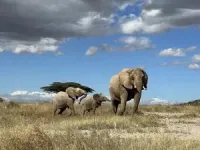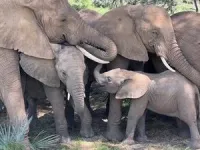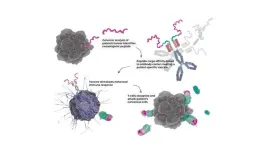(Press-News.org) Habitat loss and poaching have driven dramatic declines in African elephants, but it is challenging to measure their numbers and monitor changes across the entire continent. A new study has analyzed 53 years of population survey data and found large-scale declines in most populations of both species of African elephants.
From 1964-2016, forest elephant populations decreased on average by 90%, and savanna elephant populations fell on average by 70%. In combination, populations declined by 77% on average. The study compiled survey data from 475 sites in 37 countries, making it the most comprehensive assessment of African elephants to date.
Declines were not uniform across the continent, with some populations disappearing completely and others showing rapid growth. Colorado State University Professor George Wittemyer, one of the architects of the study and chair of the scientific board of Save the Elephants, said that identifying success stories where elephant populations are stable or increasing could help with their conservation.
"The context and the solutions at different sites can be quite different, but there are examples where people are effectively managing and protecting these populations,” Wittemyer said. “It helps to have a contextually relevant model for elephant conservation, and we've got that in a lot of different places.”
The study, published in Proceedings of the National Academy of Sciences, modeled site-level elephant density rather than numbers because the survey area was not constant over time for most survey sites. A clear trend toward smaller populations emerged.
"This paper shows the scale of the declines and how widespread they are across the continent,” Wittemyer said. “It shines a light on how quickly even something as big and noticeable as elephants can just disappear.”
Not simple arithmetic
Elephants may be big and noticeable, but counting them is complicated and resource intensive. Surveys of savanna elephants are done by spotters in planes, and forest elephants must be counted on foot. Drones aren’t yet capable of the long flights over remote areas necessary to survey elephants, and processing drone imagery also is resource intensive.
Africa is more than three times the size of the United States, and each African country has its own wildlife management policies and political system. Some places survey regularly, and others not at all. Existing surveys were conducted through careful logistical planning and resource investment.
"We were really happy to bring all of that data together and leverage it, given the effort and care taken to collect it,” Wittemyer said.
As elephant populations declined, some protected spaces were condensed and survey borders changed. To compensate for shrinking survey areas and gaps in data, the study authors had to use places with good information to estimate population change for nearby places with less information. They looked at site-based trends to get a picture of the overall distribution of trends.
“The strength of our approach is that we were able to infer these trends, even in places where the data were extremely poor, in a way that allowed the results from each survey site to be compared," said co-author Charles Edwards, a research scientist with CEscape consultancy services. “Understanding how and where trends are different across the range of a species is arguably more important for their conservation than an overall change in abundance, which may only reflect change in the largest populations."
"It's not a metric of the number of elephants left on the continent,” Wittemyer added. “It's an assessment of how each population is doing, and they're generally not doing great.”
Shifting distribution
The study examined how African elephants fared by species and region. In the war-torn Sahel region of northern Africa, elephant populations have been decimated. Eastern and central Africa generally saw declines from ivory poaching as well as from human population growth and wilderness conversion crowding out elephants.
However, elephants are thriving in parts of southern Africa, particularly in Botswana, where populations have been protected and sustainably managed.
The authors said that the study’s comprehensive assessment of the status of African elephants is fundamental to management decisions like knowing where to invest limited funding and capabilities to best protect elephants.
"The overall story is one of decline, but we're focusing on long-term stability of the species,” Wittemyer said. "I think we can do that in a bunch of places, but not all places."
Co-authors of the study, “Survey based inference of continental African elephant decline,” are Kathleen Gobush (University of Washington), Fiona Maisels (Wildlife Conservation Society and University of Stirling), Dave Balfour (Nelson Mandela University) and Russell Taylor (WWF Namibia).
END
50 years of survey data confirm African elephant decline
2024-11-11
ELSE PRESS RELEASES FROM THIS DATE:
Swirling polar vortices likely exist on the Sun, new research finds
2024-11-11
EMBARGOED: Until 3 p.m. ET on Monday, Nov. 11, 2024
Contacts:
Laura Snider, NSF NCAR and UCAR Manager of Science Communications
lsnider@ucar.edu
303-827-1502
David Hosansky, NSF NCAR and UCAR Manager of Media Relations
hosansky@ucar.edu
720-470-2073
Like the Earth, the Sun likely has swirling polar vortices, according to new research led by the U.S. National Science Foundation National Center for Atmospheric Research (NSF NCAR). But unlike on Earth, the formation and evolution of these vortices ...
Protein degradation strategy offers new hope in cancer therapy
2024-11-11
RIVERSIDE, Calif. -- In drug discovery, targeted protein degradation is a method that selectively eliminates disease-causing proteins. A University of California, Riverside team of scientists has used a novel approach to identify protein degraders that target Pin1, a protein involved in pancreatic cancer development.
The team reports today in the Proceedings of the National Academy of Sciences that it has designed agents that not only bind tightly to Pin1 but are designed to cause its destabilization and cellular ...
Mental fatigue leads to loss of self-control by putting brain areas to sleep
2024-11-11
Prolonged mental fatigue can wear down brain areas crucial for the individual ability to self-control, and cause people to behave more aggressively.
In a new multidisciplinary study published in the PNAS, a group of researchers from neuroscience and economics at the IMT School of Advanced Studies Lucca links the debated concept of "ego depletion", that is to say the diminution of willpower caused by previous exploitation of it, to physical changes in the areas that govern executive functions in the brain. In particular, the ...
Was ‘Snowball Earth’ a global event? New study delivers best proof yet
2024-11-11
Geologists have uncovered strong evidence from Colorado that massive glaciers covered Earth down to the equator hundreds of millions of years ago, transforming the planet into an icicle floating in space.
The study, led by the University of Colorado Boulder, is a coup for proponents of a long-standing theory known as Snowball Earth. It posits that from about 720 to 635 million years ago, and for reasons that are still unclear, a runaway chain of events radically altered the planet’s climate. Temperatures plummeted, and ice sheets that may have been several miles thick crept over every inch of Earth’s surface.
“This study presents the first physical evidence ...
Scientists issue call to action underlining importance of microbial solutions to tackle climate crisis
2024-11-11
Ahead of COP29, Applied Microbiology International (AMI) has partnered with leading global scientific organisations to issue a unified call to action, spotlighting microbial solutions as pivotal in combating climate change.
In a strategic publication, released in multiple high-impact scientific journals at once, the joint paper advocates for the establishment of a global science-driven climate task force. This initiative aims to expedite the deployment of microbiome technologies, providing stakeholders worldwide with access to effective and immediate solutions.
Signatories of the paper, ‘Microbial solutions must be deployed against the climate catastrophe’ ...
Ochsner Transplant Institute among site collaborators in New England Journal of Medicine HIV-to-HIV kidney transplant study
2024-11-11
NEW ORLEANS – The Ochsner Transplant Institute served as one of 26 U.S. transplant centers collaborating in an HIV-to-HIV kidney transplant study published by The New England Journal of Medicine (NEJM). The article, Safety of Kidney Transplantation from Donors with HIV, details findings supporting HIV-to-HIV kidney transplants as safe and just as effective as those using organs from donors without HIV.
Human immunodeficiency virus, commonly known as HIV, attacks cells in the body that fight infection and there is currently no known cure. In the U.S.,1.2 million people are living with HIV. According to the National ...
Scientists call for global action on microbial climate solutions
2024-11-11
Washington, D.C. — Nov. 11, 2024 — Today, leaders from scientific societies, institutions and publishing bodies issued an urgent call for the global community and governments to take immediate and decisive emergency climate action. This appeal is made through an editorial published in mSystems, released on the opening day of the 2024 United Nations Climate Change Conference (COP29). Key contributors to this initiative include Virginia Miller, past president of the American Society for Microbiology (ASM); Jack Gilbert, Editor-in-Chief of mSystems; and Jay Lennon, ...
New antibody could be promising cancer treatment
2024-11-11
Researchers at Uppsala University and KTH Royal Institute of Technology have developed a new form of precision medicine, an antibody, with the potential to treat several types of cancer. Researchers have managed to combine three different functions in the antibody, which together strongly amplify the effect of T cells on the cancer tumour. The study has been published in Nature Communications.
Researchers have developed a unique type of antibody that both targets and delivers a drug package via the antibody itself, while simultaneously activating the immune system (“3-in-1 design”) for personalised immunotherapy treatments.
“We ...
The public implications of private substitutes for electric grid reliability
2024-11-11
Climate change events have, in recent years, placed increasing strain on public electrical grids in the United States. In response to this vulnerability, some consumers are turning to private alternatives to the electric utility, like generators and batteries. A new paper in the Journal of the Association of Environmental and Resource Economists studies who adopts these private alternatives and how adoption responds to grid failures. The paper also studies how public electric grid reliability may change due to this proliferation and how these changes will affect the wellbeing of all households.
In ...
Religiosity, spirituality, and meaning-making generally associated with lower suicidality
2024-11-11
November 11, 2024 — All aspects of religiosity, spirituality, and meaning-making (R/S/M) relate to suicidality in people with a psychiatric diagnosis or a recent suicide attempt, according to a systematic review and meta-analysis published in Harvard Review of Psychiatry, part of the Lippincott portfolio from Wolters Kluwer.
"Protective dimensions seemed to exert relatively stable effects across different religions and life views," Bart van den Brink, MD, PhD, of the Department of ...






